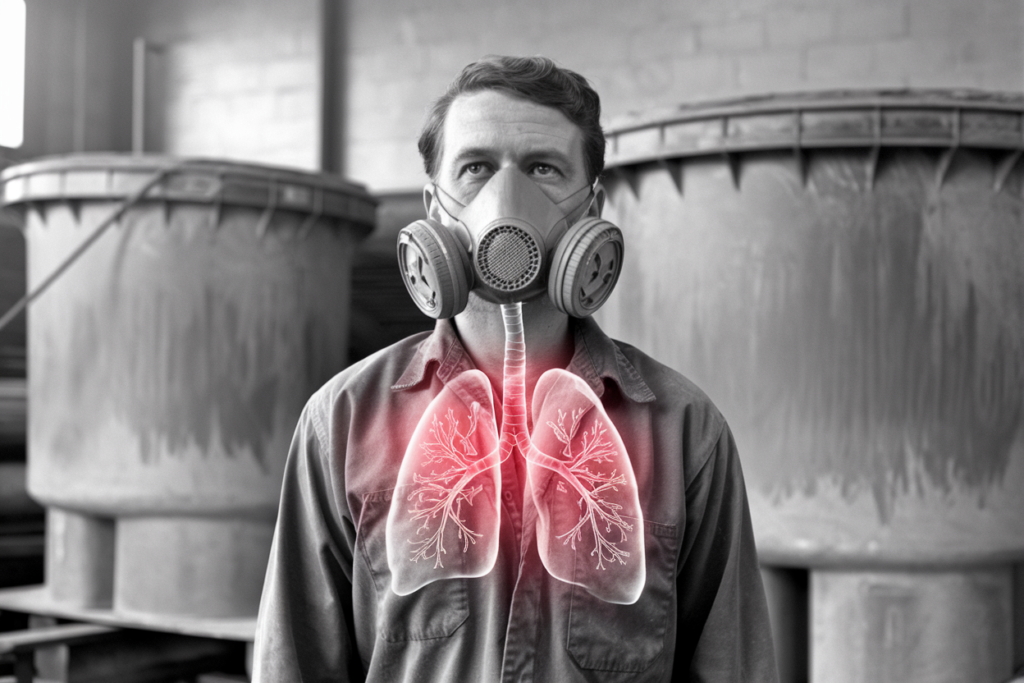Mesothelioma is a rare and aggressive form of cancer that originates in the mesothelium—the thin layer of tissue covering most internal organs. It is most often linked to asbestos exposure, a fibrous mineral historically used in construction, insulation, and various industrial materials. With a latency period that can span decades, mesothelioma is frequently diagnosed at an advanced stage, making it a particularly challenging disease to treat.
Types of Mesothelioma
Mesothelioma is classified based on the location of the cancer:
1. Pleural Mesothelioma
Affects the pleura, the thin membrane surrounding the lungs. It is the most common type, accounting for approximately 75% of all cases.
- Symptoms:
- Persistent chest pain
- Shortness of breath
- Dry, persistent cough
- Fatigue and fever
- Fluid buildup in the chest (pleural effusion)
- Notable Facts: Survival rates vary depending on early diagnosis, with emerging treatments improving outcomes.
2. Peritoneal Mesothelioma
Develops in the peritoneum, the lining of the abdominal cavity.
- Symptoms:
- Abdominal pain and swelling
- Digestive problems, including nausea or diarrhea
- Weight loss
- Ascites (fluid buildup in the abdomen)
- Notable Facts: Treatments like cytoreductive surgery combined with Hyperthermic Intraperitoneal Chemotherapy (HIPEC) have shown significant success.
3. Pericardial Mesothelioma
A rare type affecting the pericardium, the protective lining around the heart.
- Symptoms:
- Chest pain
- Irregular heartbeat (arrhythmia)
- Fluid buildup around the heart (pericardial effusion)
- Difficulty breathing
- Notable Facts: Due to its rarity, diagnosis and treatment options remain limited.
4. Testicular Mesothelioma
A very rare form that affects the tunica vaginalis, the lining surrounding the testes.
- Symptoms:
- Swelling in the scrotum
- Lumps or masses in the testicular area
- Notable Facts: Less than 1% of mesothelioma cases are testicular, making it the least studied subtype.
Causes of Mesothelioma

The predominant cause of mesothelioma is asbestos exposure. When asbestos fibers are inhaled or ingested, they can embed in the mesothelium, causing inflammation, scarring, and genetic damage to cells over time.
High-Risk Occupations
- Construction workers
- Shipbuilders and dockworkers
- Insulation manufacturers
- Firefighters
- Industrial workers
Secondary Exposure
Family members can be exposed to asbestos indirectly, as fibers brought home on clothing, tools, or hair can pose significant risks.
Other Potential Causes
- Radiation exposure
- Genetic predisposition
- Exposure to zeolites (minerals chemically similar to asbestos)
Symptoms of Mesothelioma
Symptoms often mimic less serious illnesses, leading to delays in diagnosis. Key symptoms include:
- Persistent chest or abdominal pain
- Chronic coughing
- Shortness of breath
- Unexplained weight loss
- Fatigue and weakness
- Swelling in the abdomen or chest area
- Fever or night sweats
Diagnosis
Accurate diagnosis requires a combination of methods:
- Imaging Tests
- X-rays, CT scans, or MRIs to detect abnormalities.
- Biopsy
- Fine-needle aspiration or surgical biopsy to confirm cancer.
- Blood Tests
- Biomarker analysis to identify mesothelioma-specific mutations or markers.
- Advanced Techniques
- Liquid biopsies using blood samples for early detection.
Early detection methods have improved significantly, increasing survival rates and treatment success.
Treatment Options

1. Surgery
- Removes tumors or affected tissue.
- Common procedures:
- Pleurectomy/Decortication (P/D): Removes part of the pleura and visible tumors.
- Extrapleural Pneumonectomy (EPP): Removes the affected lung, pleura, and other tissues.
2. Chemotherapy
- Standard drugs: Pemetrexed and Cisplatin.
- Newer drugs: FDA-approved Pembrolizumab (Keytruda) for advanced cases.
3. Radiation Therapy
- Targets cancer cells and shrinks tumors to alleviate symptoms.
4. Immunotherapy
- Medications like Nivolumab (Opdivo) and Ipilimumab (Yervoy) are improving outcomes by boosting the immune system.
5. Experimental Treatments
- Gene Therapy: Alters genetic material to attack cancer cells.
- Cancer Vaccines: Stimulate the immune system against mesothelioma.
- Clinical Trials: Testing novel therapies such as ADI-PEG20 combinations.
Prognosis and Survival Rates
- Pleural Mesothelioma: Median survival is 12–21 months with treatment.
- Peritoneal Mesothelioma: Specialized therapies can extend survival beyond five years.
- Pericardial and Testicular Mesothelioma: Prognosis is generally poorer due to rarity and limited treatment options.
Prevention
Steps to Minimize Risk
- Adhere to safety protocols in asbestos-handling industries.
- Hire professionals for asbestos abatement in older buildings.
- Advocate for stricter asbestos regulations.
Notable Regulatory Advances
In March 2024, the EPA finalized a ban on chrysotile asbestos, significantly reducing new exposure risks.
Mesothelioma and Veterans

Veterans represent 30% of mesothelioma cases due to asbestos use in military equipment and construction. A 2024 Veterans Registry aims to improve early detection and treatment access for veterans.
Legal and Financial Assistance
Individuals affected by asbestos-related diseases have several avenues for legal and financial assistance:
- Asbestos Trust Funds: Billions of dollars are available for affected individuals.
- Lawsuits: Recent verdicts, like a $63.4 million judgment in 2024, highlight ongoing legal accountability.
- Veteran Benefits: Specialized programs offer compensation and medical care for service-related cases.
Asbestos Trust Funds: To address the extensive liabilities from asbestos exposure, numerous companies established asbestos trust funds during bankruptcy reorganizations. These trusts, collectively holding over $30 billion, are designed to compensate current and future victims of asbestos-related illnesses, such as mesothelioma and asbestosis. Claimants can file with multiple trusts if exposed to products from different companies, potentially receiving substantial compensation. The average payout from these trusts ranges between $300,000 and $400,000, though amounts can vary based on individual circumstances.
Lawsuits: Beyond trust fund claims, individuals may pursue legal action against companies responsible for asbestos exposure. Recent verdicts underscore the ongoing legal accountability of such companies. For instance, in 2024, a significant judgment of $63.4 million was awarded in a mesothelioma case, reflecting the courts’ recognition of the severe impact of asbestos exposure on victims’ lives. These lawsuits not only provide financial compensation but also serve as a deterrent against negligent practices.
Veteran Benefits: Military veterans, particularly those who served between the 1930s and 1970s, are at a heightened risk of asbestos-related diseases due to the material’s prevalent use in military equipment and facilities. Recognizing this, the U.S. Department of Veterans Affairs (VA) offers specialized programs that provide compensation, medical care, and support services to affected veterans. These benefits aim to address the unique challenges faced by veterans suffering from asbestos-related conditions.
Navigating these options can be complex, and seeking guidance from legal professionals experienced in asbestos litigation is advisable to ensure that affected individuals receive the full benefits and compensation they are entitled to.
Hope for the Future
Emerging treatments, innovative diagnostic tools, and cutting-edge research are transforming mesothelioma care. With continued advancements, patients can look forward to better outcomes and quality of life.
For more detailed information, consult a medical professional specializing in asbestos-related diseases.
